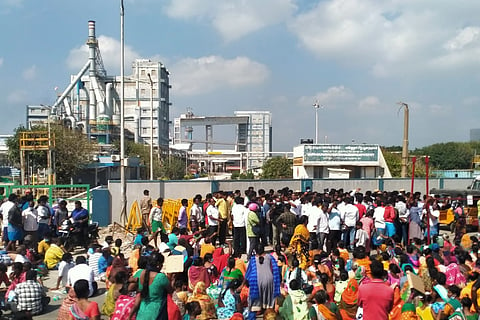

A seven-member Technical Committee constituted by the Government of Tamil Nadu, to ascertain the cause of the ammonia gas leak from the Coromandel International Limited (CIL), a fertiliser manufacturing plant, has ascertained that the leak had occurred in the pipelines close to the shore. The committee has said that Cyclone Michaung which touched Chennai's coast on December 3, could have possibly relocated heavy granite boulders located around the pipelines under the sea that damaged the gas line resulting in the leak. The committee has ordered for replacing the offshore pipelines with state-of-the-art monitoring, automatic control and accident prevention systems in place.
The ammonia gas leak occurred around 11:45 pm on December 26, and had affected the villages located in close proximity to the plant’s pipeline. Around 44 people were hospitalised due to the leak.
The Tamil Nadu Pollution Control Board (TNPCB) has also been directed to ensure that CIL pays a compensation of Rs 5.92 crores for “environmental mitigation,” and has asked the TNPCB to take legal action against the unit for not complying with the Air (Prevention and Control of Pollution) Act, which states that gaseous substances’ concentration in the atmosphere must not harm human and other living beings nor the environment.
Read: For residents of Chennai’s Ennore, it's no happy new year
The committee chaired by R Kannan, Secretary of TNPCB, has mandated that the company should install an adequate number of ammonia sensors around the plant and near the pipeline to monitor both the concentration levels in the sea and in the air by the hour. The unit must also carry out on-site and off-site emergency preparedness studies, use automatic tripping systems for detecting a build-up in pressure, and install high volume sirens to alert the people living in the villages around the plant during accidents or abnormal operations, the committee report said.
The recommendations also emphasised on the need for the company to hold safety audits of the plant through credible agencies and has asked for the company to furnish the reports online.
Residents from villages around the plant have been protesting for 40 days demanding that the company be shut permanently.